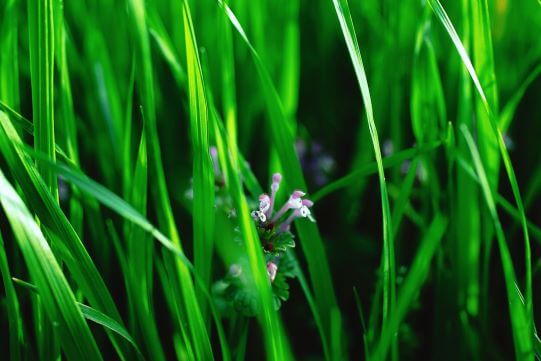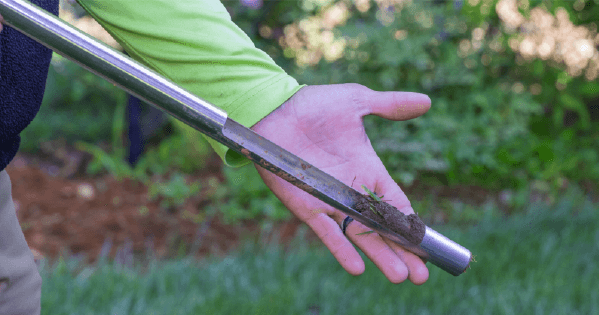Don’t let Henbit become a habit!

Henbit is a relative of the mint plant and is considered a salad green or herb for cooking in some European and Asian cultures. In the U.S., however, Henbit is not regarded worthy of the dinner plate. It is considered a common annual broadleaf weed that spreads by seed and germinates in fall or winter. During the warmer winter weather, it will continue to grow in many environments—lawns, fields, pastures, and along roadsides—but it will go dormant as the temperatures turn colder. Henbit likes moist soil and is one of the few weeds that thrives in the shade, although it can tolerate full sun.
What does it look like?
Henbit features hairy greenish leaves with a purple hue, square purple stems, and purple flowers. After a winter of dormancy, it will emerge in the spring growing rapidly in clusters. When it takes over a field, it looks like a lush carpet of plum-colored flowers. But don’t be deceived by its pretty purple patches. This weed is indeed a danger to a healthy landscape.
Why is it a problem for my lawn?
Henbit’s stems grow almost sideways making it impossible to eradicate from your lawn with simple mowing techniques. Since it grows well in wetter soil, it threatens the health of good soil as it spreads. The moisture held in the soil, the better the chance for bacteria, fungus, and disease. An overgrowth of Henbit must be dealt with promptly.
How can I prevent Henbit from taking over?
The best way to prevent a Henbit infestation is to create a dense healthy lawn. Overseeding will create a thick turf, which won’t allow room for Henbit to take over. Pay attention to shady areas near bushes and under trees where soil conditions are ripe for Henbit growth. In addition, this weed grows well in thinning turf and is simpler to dig up with a shovel when it has only grown in small patches.
To avoid Henbit from becoming a habit, keep in mind three key factors to creating a healthy lawn:
- Mow weekly.
- Water deeply and infrequently.
- Overseed with favorable turfgrasses to choke out weeds.
How can I control Henbit?
The two main methods of controlling a Henbit outbreak in your lawn are cultural, chemical or both.
Cultural control involves good watering, mowing, seeding and fertilizing practices. The healthier your lawn is to begin with, the less likely you are to face a Henbit outbreak.
Chemical control is the best option to control Henbit that has sprouted. The best way to ensure Henbit does not become a problem for your Georgia lawn is to use a pre-emergent application of herbicide as soon as possible this fall. By now, seeds are beginning to germinate, which means new growth is right around the corner. In addition to a dense, healthy lawn, herbicides applied in fall or early winter offer a great defense against Henbit’s takeover. A post-emergent herbicide application will work as well if the weed is actively growing.
Simply Green experts can help!
Simply Green Lawn Care Plus is dedicated to creating healthy lawns and landscapes for the Georgia homeowner. Technicians are trained to identify problems such as pests, weeds, and lawn diseases, and to offer solutions. Contact Simply Green today to schedule a visit from one of our experts.
About Simply Green Lawn Care

Simply Green aims to provide the highest quality lawn care, mosquito control, and lawn pest control services to Georgia residents.
We are locally owned and operated which allows us to be accessible, attentive, and responsive for customers in Georgia.
Our well-trained team is easy to work with and determined to exceed expectations.
All our plant health care specialists are Georgia Department of Agriculture Certified and maintain their Category 24 applicators license.


